
Archaeology News in Suffolk
A collection of archaeological news, projects and events in Suffolk from Suffolk County Council Archaeological Service
Welcome to our e-newsletter for January 2025
Save the Date! Archaeology Conference
📅 When: Thursday 5th June 2025
📍 Where: Corn Exchange, Ipswich
💰 Price: Tickets available nearer the time
An Archaeology Conference by the Suffolk Archaeological Recording Foundation is planned, with a range of talks focussing on finds and new research from Suffolk and East Anglia. Speakers to be announced. More details will be posted on the Suffolk Archaeological Recording Foundation's webpage in due course. The foundation supports the recording, analysis and conservation of archaeological objects in Suffolk, especially those found by members of the public.
Archaeology in Schools
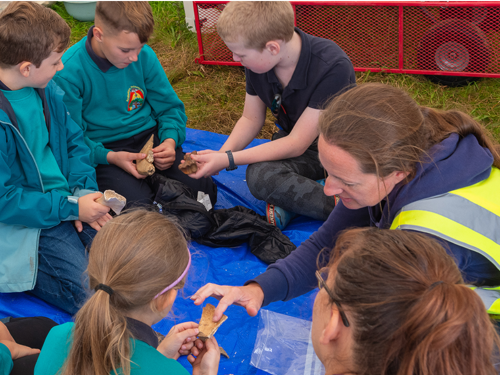
Image: Archaeology school session (© Suffolk County Council)
Archaeology in the Classroom with New Education Offer
Suffolk County Council’s successful Rendlesham Revealed archaeology project is expanding its legacy to primary schools across the county. A new hands-on archaeology education offer was launched last autumn with a qualified primary school teacher appointed, going into primary schools and home-education groups to deliver archaeology in the classroom using real artefacts excavated from Suffolk. In-classroom sessions are specifically designed for children of primary school age and has been tailored to add value to the history national curriculum, covering all periods of history including Stone Age, Romans, Anglo-Saxon, medieval and post-medieval (Tudor and Victorian). A variety of archaeology activities are on offer that can be adapted to suit a group's needs. For more information and to book an archaeology session, visit the Archaeology Education webpage at heritage.suffolk.gov.uk
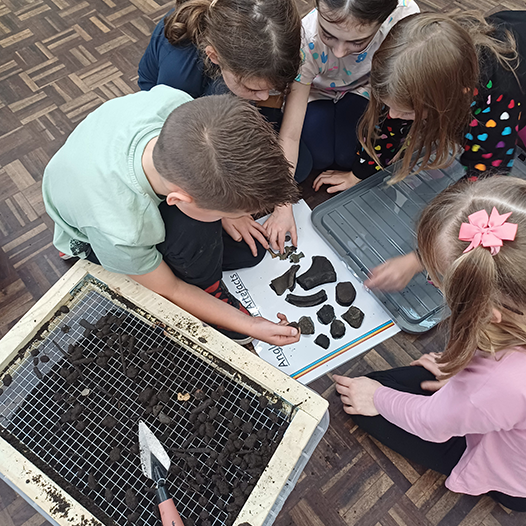
Image: Archaeology Detectives classroom session. (© Suffolk County Council)
Archaeology Detectives at Stutton Primary School
Last autumn, our new Outreach Officer visited Stutton Primary School to deliver an in-classroom "Archaeology Detectives" session to the Year 3/4 Swans Class. Each student became an “Archaeology Detective” for the day, entering the fascinating world of archaeology and learning about the real artefacts in our archaeology handling collection. The students learnt about archaeological techniques and processes before grabbing some gloves and trowels to sieve for real and replica artefacts - a brand new activity that replicates the sieving technique used in archaeological digs.
"My favourite part of the day was learning about archaeology because it was so interesting."
Featured Projects
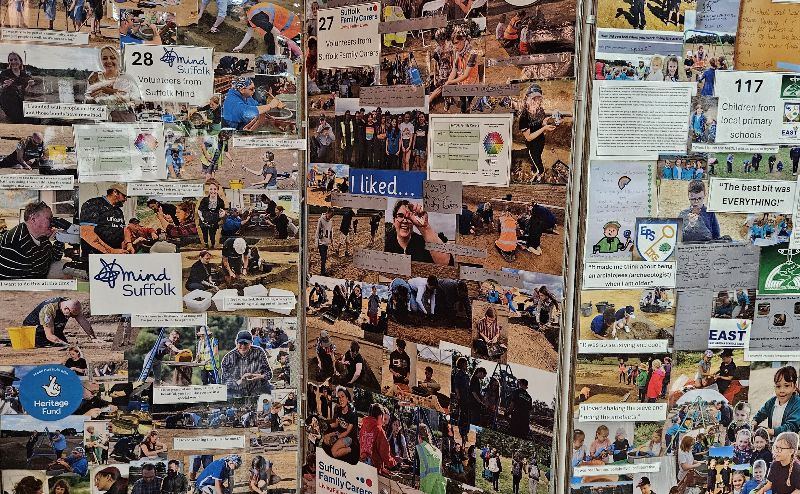
Image: Collage of volunteers involved in Rendlesham Revealed
Rendlesham Revealed Wrap Up
After six years of hard work and incredible results, the Rendlesham Revealed project, made possible by a grant from The National Lottery Heritage Fund, has come to a close. We are incredibly proud of what the project, volunteers and partners have achieved and the extent to which the local community were involved, engaging 1,565,996 people across all of its activities – both digitally and in-person. The results from all three years’ archaeological fieldwork also made exciting new discoveries, adding to our understanding of Rendlesham's unique archaeology as an internationally significant Anglo-Saxon royal settlement, and its place in the early East Anglian kingdom 1,400 years ago.
Open Access Article: Rendlesham Excavations 2021-2023
An interim paper on the archaeological excavations at Rendlesham 2021-2023, undertaken as part of the Rendlesham Revealed project, has been published in Medieval Archaeology and made openly accessible by University College London. Written by experts from the project team, the article summarises the main results of excavation in advance of full analysis, and what this means for our understanding of the site and its wider implications of early medieval settlement studies.
New Book "Lordship and Landscape in East Anglia"
A new book details how 5,000 items of metalwork discovered by four local metal detector users during 10 years of archaeological fieldwork in Rendlesham have helped change the way academics think about the earliest English kings and their kingdoms. The fieldwork and significance of the finds, co-ordinated by the Suffolk County Council Archaeological Service (SCCAS) between 2008-2017, are shared in the new book, Lordship and Landscape in East Anglia AD 400–800, released last month. A team of experts, funded by a project grant from The Leverhulme Trust, reconstructed the layout and history of settlement, its place in wider landscape, the social connections and trade networks of those who lived there. Lordship and Landscape in East Anglia AD 400–800 is published by the Society of Antiquaries of London, with grants from the Marc Fitch Fund, The Sutton Hoo Society, University College London, Historic England, and the Scarfe Charitable Trust. .
Finds Recording in Suffolk
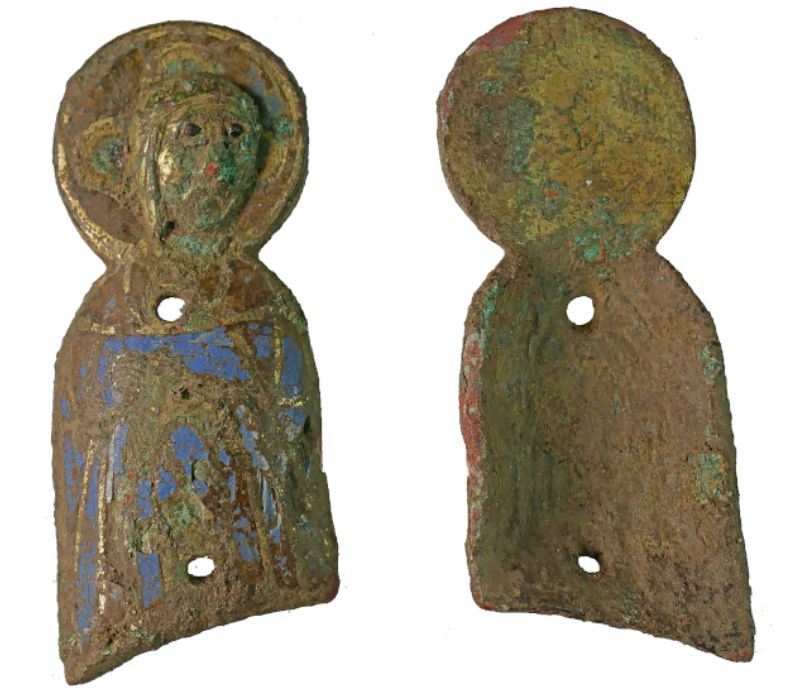
Image: Medieval 'Limoges style' cross mount (© Suffolk County Council)
Medieval 'Limoges style' cross mount, Sibton
This ornately adorned copper-alloy mount represents a saint, presumably the Virgin Mary. These ornate enamelled mounts are quite rare. This mount was most likely created in the then-famous Limoges factories in France, who were well-known for their ability to create both secular and liturgical enamelled metal goods.
If you have recently found an archaeological object in Suffolk which you'd like identified and recorded, our Finds Recording Team can help. Find out more about Finds Recording here.
From the Vaults
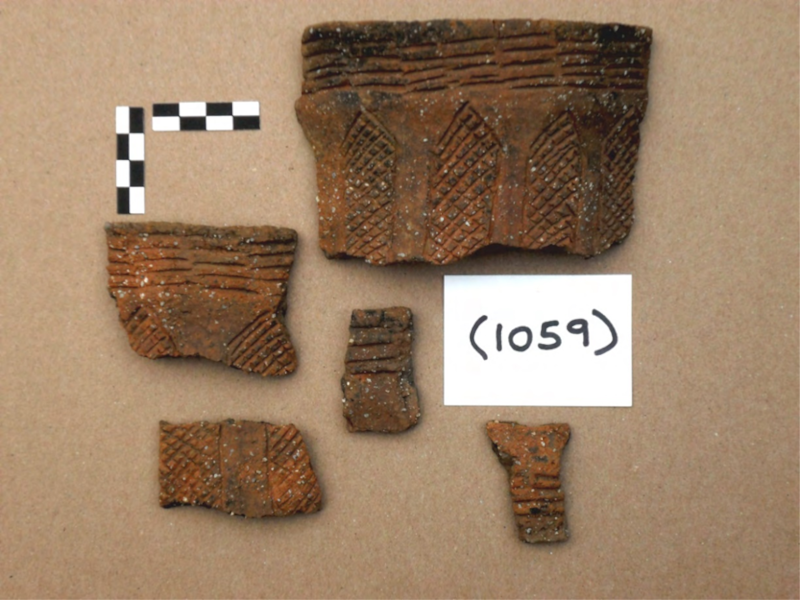
Image: Sherds of a Long Necked Beaker (© Foundations Archaeology)
Later Neolithic/Bronze Age settlement at Holbrook
In an area rich in recorded prehistoric sites and cropmarks, an archaeological excavation in Holbrook has revealed significant evidence of Late Neolithic/Early Bronze Age Beaker period (2900 BC – 1600BC) activity as well as later prehistoric field systems. Some fantastic Beaker pottery and lithic artefacts were recovered from several pits, and fragments of baked clay may suggest local pottery production or domestic hearths.
The archaeological excavation was undertaken by Foundations Archaeology ahead of a proposed residential development and was commissioned by BSA Heritage on behalf of Taylor Wimpey. Suffolk County Council’s archaeological officers monitored the project to ensure that the site was excavated and recorded to a high standard.
Thank you for joining our e-newsletter, for those who are new, here's a brief summary of what we do.
We are the main provider of archaeological advice in Suffolk and to promote the conservation, enhancement and understanding of Suffolk's distinctive historic environment, we:
- maintain a record of archaeology and heritage assets, the Historic Environment Record
- provide advice to planners, developers and farmers
- identify and record finds made by members of the public
- curate an archive for fieldwork projects carried out in the county
- publish the results of fieldwork and other research into Suffolk's past